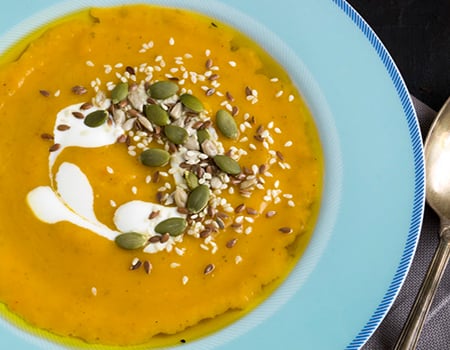Answers To The 10 Most Frequently Asked Questions About A Plant-Based Diet
A plant-based diet, full of fruits, vegetables, whole grains and legumes, is a powerful way to achieve good health.
- Will I get enough protein on a plant-based diet?
A varied plant-based diet of whole grains, vegetables, and beans can easily meet your daily protein needs. An average woman needs about 46 grams of protein per day; the average man about 56. Research shows that most Americans — including those on a plant-based diet —easily reach these levels. Learn more about protein.
- What are the best sources of calcium on a plant-based diet?
By eating a varied plant-based diet, you’ll get all the calcium you need to build strong bones without the added health risks of milk and other dairy products. Leafy green vegetables, like broccoli, Brussels sprouts, kale, and collards, are loaded with calcium. Calcium absorption of leafy green vegetables is actually higher than cow’s milk. Beans, fortified juices, and plant milks are also great sources of calcium. Learn more about how to build healthy bones on a plant-based diet.
- Why eat a low-fat, plant-based diet?
Plant-based diets low in fat are a powerful way to achieve good health. Diets focused on fruits, vegetables, whole grains, and legumes avoid saturated fats associated with heart disease, diabetes, and other conditions. Research shows low-fat diets improve blood sugar and cholesterol levels, improve mortality against cancer, and aid in weight management.
- What supplements do I need?
It is important to include a reliable source of vitamin B12 in your diet. Vitamin B12 is an essential nutrient that is necessary for healthy nerves and blood. Vitamin B12 is not made by plants or by animals, but by bacteria. You can easily meet your vitamin B12 needs with a daily supplement. Fortified foods, such as breakfast cereals, plant milks, and nutritional yeast, may also contain B12, but taking a supplement regularly is often a more reliable source.
- Is a plant-based diet healthy during pregnancy?
A plant-based diet is a great choice at every stage of life, including pregnancy and breastfeeding. A healthful, well-planned plant-based diet provides all the nutrients you and your developing baby need. Calorie needs increase only modestly during pregnancy. According to the Academy of Nutrition and Dietetics, it works out to about 340 extra calories per day in the second trimester and about 450 extra calories per day during the third.
During pregnancy (especially the second and third trimester), women should eat an additional 25 grams, or around 70 grams of protein per day. This is usually an easy goal to meet by eating a variety of plant-based foods, including beans, lentils, quinoa, tempeh, tofu, whole grains, and vegetables. A day’s menu could include oatmeal with fruit, walnuts, and chia seeds for breakfast; lentil soup and a hummus sandwich for lunch; a brown rice, almond, and chickpea bowl for dinner; and a slice of whole-wheat bread with peanut butter for a snack.
- Is a vegan diet healthy for children?
Eating habits are set in early childhood. Choosing a plant-based diet can give your child — and your whole family — the opportunity to learn to enjoy a variety of nutritious foods. Children who are raised on healthful vegan diets have a reduced risk for heart disease, cancer, obesity, diabetes, and other conditions. Adolescents raised on a plant-based diet often find they have an easy time maintaining a healthy weight. They also have fewer problems with acne, allergies, and gastrointestinal problems than their peers who eat animal products.
- Are soy products healthy?
Soy products offer a wide array of health benefits. Eating whole soy foods may reduce the risk of breast cancer and several other types of cancer, fibroids, and even inflammation. Soy is helpful for bone health, heart health, and menopausal symptoms. However, the benefits of soy appear to come from foods made from whole soy. Focus on tofu, tempeh, edamame, soy milk, and miso as part of a balanced, plant-based diet. Learn more about soy.
- Will a plant-based diet lead to weight loss?
Whether you want to lose weight, maintain a healthy weight, or just eat better, a plant-based diet can help you achieve your goals. Plant-based diets are beneficial for weight loss, because they are rich in fiber, which helps fill you up without adding extra calories. Aim for 40 grams of fiber a day, which is easy to do when you move vegetables, fruits, whole grains, and beans to the center of your plate.
By skipping meat, cheese, and eggs and limiting oils, you’re also removing a significant amount of fat from your diet. This helps keep the pounds off, because 1 gram of fat — from beef, fish, or oil — has 9 calories. Compare that to 1 gram of carbohydrate from potatoes, bread, or beans, which has only 4 calories — fewer than half of the calories found in 1 gram of fat.
- Will a plant-based diet impact gut bacteria?
Trillions of bacteria live in your digestive tract and play an important role in health. Of the thousands of species of gut microbes that live in your gut, however, some are healthy for your body — while others are not. A healthful plant-based diet improves the health and diversity of your gut microbes, preventing and treating conditions like obesity, diabetes, heart disease, and inflammation associated with autoimmune diseases. To increase good bacteria in your gut, try to fill up on fiber, pick prebiotic-rich and probiotic foods, limit fats, and avoid animal products and unnecessary antibiotics.
- How can I find a plant-based health care professional?
Many people seek physicians and other health care professionals who promote plant-based nutrition as part of their practice. Find a health care provider through this PCRM Find A Doctor resource.
Reprinted courtesy of Physicians Committee for Responsible Medicine.
The Physicians Committee for Responsible Medicine combines the clout and expertise of more than 17,000 physicians with the dedicated actions of nearly one million members and supporters worldwide. The Physicians Committee is a 501(c)(3) nonprofit organization, headquartered in Washington, DC, whose efforts are dramatically changing the way doctors treat chronic diseases such as diabetes, heart disease, obesity, and cancer. By putting prevention over pills, doctors are empowering their patients to take control of their own health.











